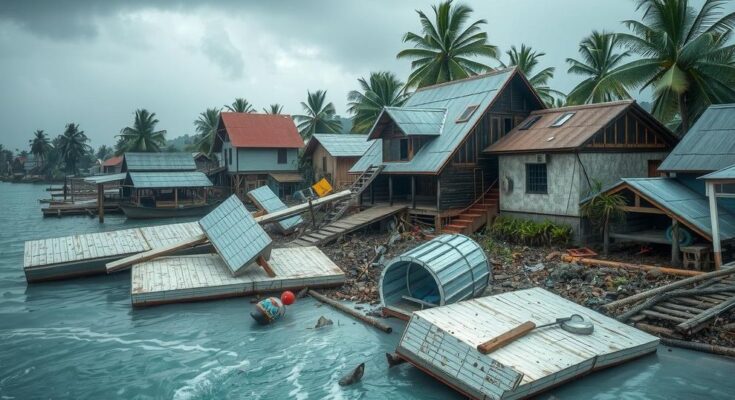Tropical Cyclone Chido has devastated Mayotte, a French territory in the Indian Ocean, with reports of widespread destruction and rising death tolls. It has sparked urgent environmental policy considerations in the Biden administration, while the COP16 summit failed to produce vital agreements on drought resilience. The situation underscores the growing severity of climate impacts on vulnerable regions and the challenges of international climate diplomacy.
Tropical Cyclone Chido struck the island region of Mayotte, a French territory situated in the Indian Ocean, on Saturday, causing catastrophic devastation. The cyclone made landfall as a Category 4 storm, boasting winds reaching up to 136 miles per hour, representing the most powerful cyclone to hit the islands in nearly a century. Reports indicate widespread destruction, particularly in slum areas housing many undocumented migrants, with a local hotel owner describing the aftermath as reminiscent of an atomic bomb’s impact. Initial reports confirm at least 14 fatalities, although this figure is anticipated to rise amidst the ongoing rescue efforts.
As the Biden administration’s term nears its conclusion, critical environmental policy decisions are being expedited. The Energy Department’s Loan Programs Office is finalizing substantial clean technology loan commitments that may face cancellation under a future Trump administration. A former policy adviser expressed that efforts are underway to secure these agreements against potential revocation. Concurrently, Trump’s transition team is advocating for the curtailment of support for electric vehicles, which could pose challenges for the U.S. green energy transition.
The recent United Nations COP16 summit ended without achieving an agreement regarding drought resilience, disappointing many representatives from developing nations who sought binding commitments from wealthier countries. This failure was met with criticism, citing a pattern of inadequate responses from international climate discussions in 2023.
This article highlights the recent impact of Tropical Cyclone Chido on Mayotte, revealing the cycle of increasing severity and frequency of tropical storms, attributed in part to climate change. The cyclone emphasizes the vulnerabilities faced by smaller, less-developed territories in the face of natural disasters. It also situates the devastation within a broader context of critical environmental policy decisions being made by the outgoing Biden administration, which may affect future support for clean technology amidst changing political dynamics. The failure of the COP16 summit to produce actionable commitments speaks to the ongoing challenges of international climate diplomacy, particularly for nations seeking aid for climate adaptation.
The devastation wrought by Tropical Cyclone Chido on Mayotte exemplifies the acute challenges posed by climate change, particularly for vulnerable island communities. As the Biden administration rushes to finalize environmental policy decisions amidst a political transition, the potential rollback by the incoming Trump administration looms large over the United States’ commitment to clean technology. Additionally, the COP16 summit’s inability to deliver a consensus underscores the complexities of global responses to climate change. As the trajectory of storms continues to intensify, the need for resilient infrastructure and comprehensive disaster response strategies becomes increasingly critical.
Original Source: heatmap.news




